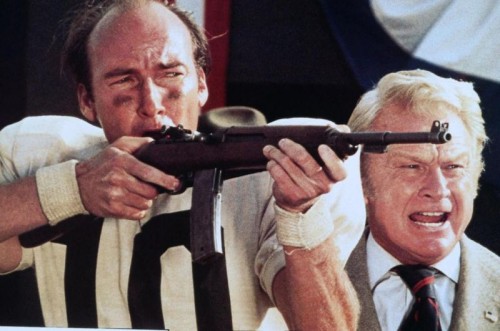Boxing went from the Sport of Kings to an all-but-empty throne in the U.S. in just two or three decades, parents no longer willing to allow their children to suffer repeated blows to the brain, even if it seemed a way out for impoverished children. (Some very non-contact sports like cricket also went away quickly in America.) It’s almost impossible to envision the NFL suffering the same fate even though there’s no path for the league to avoid the preponderance of scary health issues. In a New York Times piece, Ian McGugan argues that the pro-football cartel is too well-organized to be sidelined despite its concussion problems and PR nightmares, the sport too ingrained in America to vanish even with declining Pop Warner league participation. The opening:
“The N.F.L., from at least one perspective, has had a pretty rough month. In the span of a few days, as most everyone knows, a video surfaced depicting the Baltimore Ravens running back Ray Rice knocking his future wife unconscious; then the Minnesota Vikings superstar Adrian Peterson was booked for purportedly whipping his 4-year-old son with a tree branch. All the while, a clutch of other players faced the consequences of their own ostensible involvement in domestic-violence incidents. But as pundits wondered if the scandals could mark the beginning of the end for America’s favorite sport, the N.F.L.’s television ratings surpassed their levels from a year earlier. The uptick points to a surprising reality: Despite all its current problems, pro football is positioned to not only weather its current storm, but also to sail through it toward greater prosperity.
Boxing — another macho pastime populated by guys you might hesitate to invite to a merlot tasting — shows how a spectacle can lose its grip on the public. Once arguably the most popular sport in America, boxing has long since been divided into rival fiefs by promoters who sometimes seem to be auditioning for a Tarantino movie. N.F.L. teams, by contrast, operate in unison to protect one of the most micromanaged brands in existence. At the head of that collective is a commissioner with the broadest powers of any leader in sports. The ‘no fun league’ lays down the law on everything from the color of socks players can wear to what celebrations are acceptable after a touchdown. (The league’s most recent diktat: no dunking the ball over the goal post.) Whenever the league has faced threats in the past — gambling scandals or labor conflicts — franchise owners have generally snapped into formation behind the boss. ‘For all the talk about competition on the field,’ says Stefan Szymanski, a sports economist at the University of Michigan, ‘it’s really a socialist collective off the field.’
In many ways, after all, N.F.L. football has transcended sports to become a mass-produced, highly managed and artfully promoted product.”
Tags: Ian McGugan

